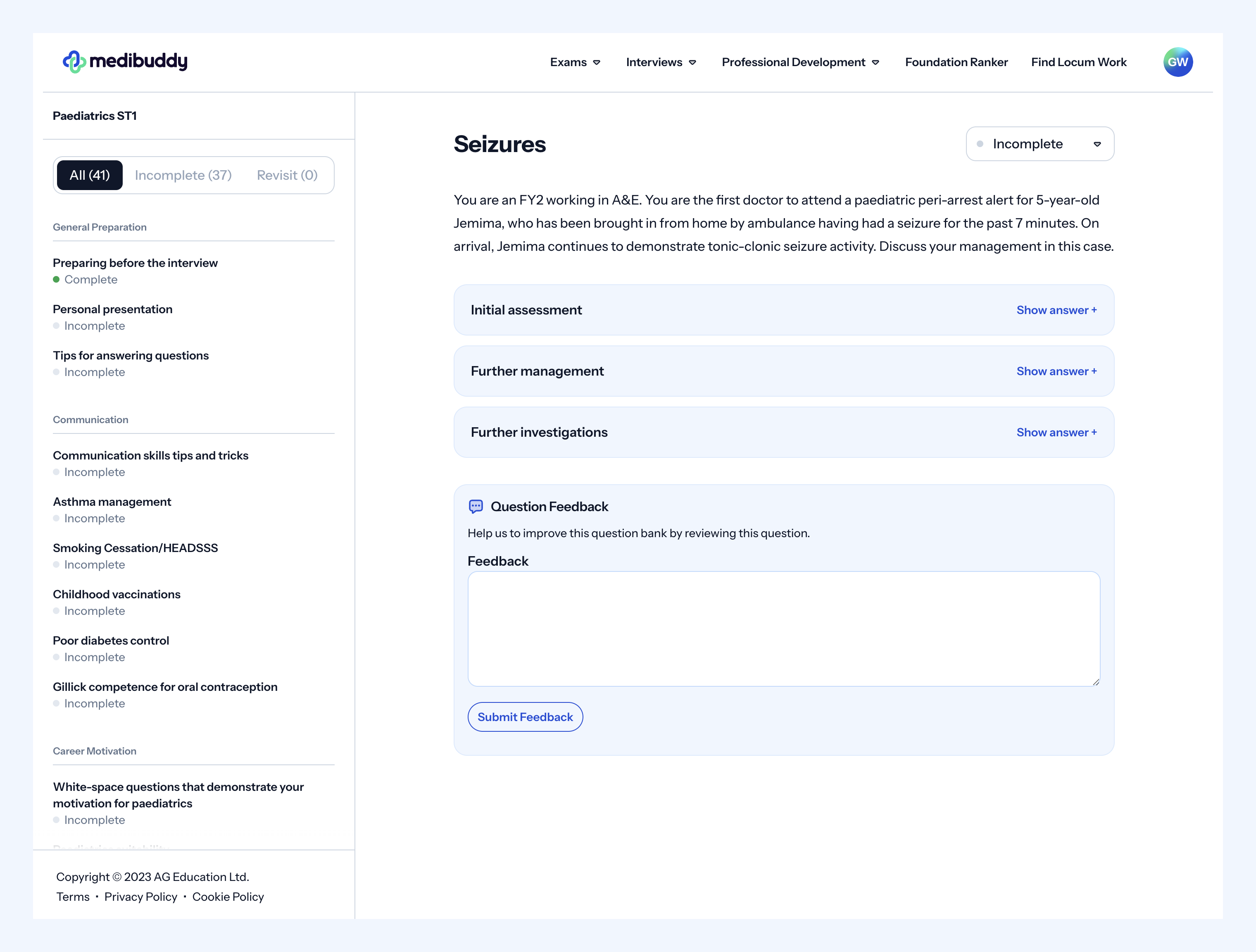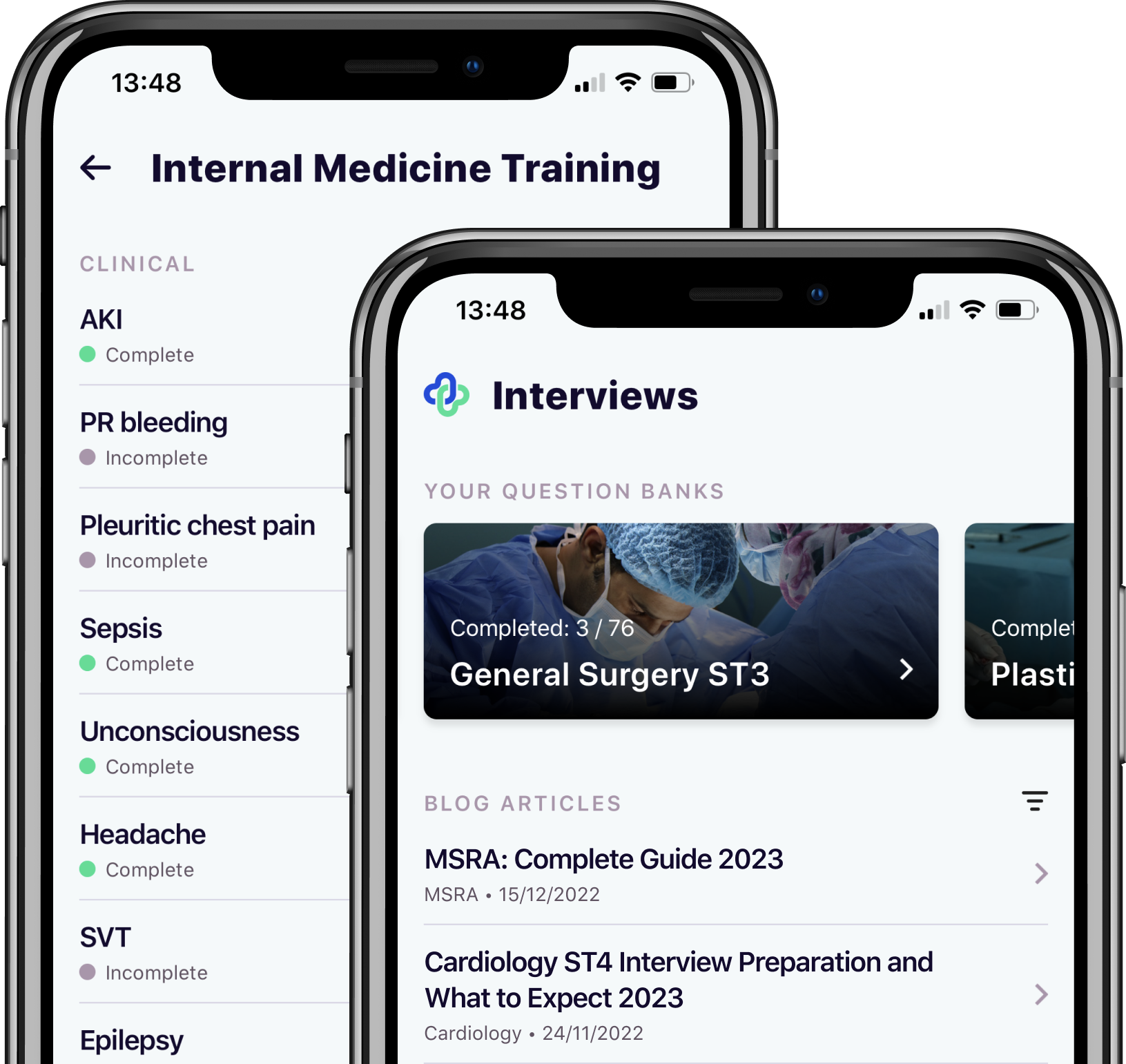
ST1 Paediatrics: Complete Guide 2025
Specialty training in paediatrics is usually entered by most doctors at the ST1 level. If you’re considering applying for ST1 paediatrics, this simple guide will provide you with all the necessary information you need, from the ST1 application process and recruitment timeline to the paediatrics interview structure.
To support you with your paediatrics ST1 interview preparation, we’ve designed a comprehensive Paediatrics ST1 Interview Question bank. Preparing for interviews whilst working can be really daunting, and with the MSRA exam no longer used for Paediatrics recruitment, more focus is placed on your interview, so it is important that you make time to prepare like you would an exam!
Paediatrics ST1 application
If you’re applying for a 2025 post, you must have no more than 2 years experience in paediatric posts (excluding Foundation posts) at the time of making your application to be eligible. Alternatively, if you have more than 2 years experience, you should aim to apply for Paediatrics ST3.
For ST1 paediatrics training, you’ll submit one application via Oriel for all participating regions, meaning you’ll be considered for programmes across the UK and offered ST1 paediatrics roles based on your performance and rank.
It’s recommended that you start your application as soon as possible to allow plenty of time to complete it fully and to the best of your ability. You’ll find the paediatrics ST1 application window in the recruitment timeline section below.
As part of your paediatrics ST1 application, you’ll be required to complete a set of white-space questions. For 2025 entry, these focus on assessing the following areas:
- Additional qualifications
- Transferable clinical skills
- Transferable clinical experience and reflection
- Quality Improvement Project (QIP) / Audit relevant to application level and experience of applicant
- Academic achievements relevant to application level and experience of applicant
- Teaching relevant to application level and experience of applicant
How is my ST1 paediatrics application scored?
For 2025 the ST1 paediatrics application will be scored as follows:
For the purpose of longlisting:
Applicants are assessed against the essential criteria outlined in the ST1 paediatrics person specification. In order to demonstrate that you are eligible to apply, and therefore progress to the next stage, you must meet all of the essential criteria.
For the purpose of shortlisting:
If you are successfully longlisted, your white-space answers will be scored by two clinical assessors. The maximum score available is 25 per assessor (50 in total), scored as follows:
| White-space question / assessment area | Points available |
|---|---|
| Additional qualifications | 3 |
| Transferable clinical skills | 5 |
| Transferable clinical experience and reflection | 5 |
| QIP / Audit | 4 |
| Academic achievements | 4 |
| Teaching | 4 |
| Total | 25 |
The application scoring framework and guidance for 2025 provides a breakdown of the scores available for each of the white-space questions.
The following are some key takeaway points from the 2025 application scoring framework and guidance, to support you to start thinking about the white-space questions and how you can maximise your score:
- Although you can score points for additional qualifications, MRCPCH qualifications and paediatric experience, these are not essential for your paediatrics ST1 application.
- The key words to note with the transferable clinical skills and transferable clinical experience and reflection are transferable and reflection. As mentioned above, you don’t necessarily need to have experience in paediatrics. You’ll score points on your application for giving examples of previous roles / experiences and reflecting on what you learnt, what skills you developed and how this will support you for a career in paediatrics.
- QIP / audit, academic achievements and teaching all specify that this is relevant to your application level and experience. However, you will score more marks for:
- QIP / audit – if you’ve designed, led and presented your data (rather than just collected data) and you’ve provided evidence of regularly participating in QIP / audits throughout your training so far.
- Academic achievements – as well as providing a good description of research that you’ve undertaken or preferably led, you’ll score more points for presenting your research at a regional, national or international presentation, and being published as a co-author, first or last author.
- Teaching – designing, leading and evaluating teaching will score you the highest possible marks.
The score you achieve for your white-space questions, as part of your ST1 paediatric application, will be used in two ways:
- If the number of eligible applicants (i.e. those who have been longlisted) exceeds the interview capacity, these scores will be used to differentiate between applicants and determine who is invited to interview.
- Following your interview, it’ll be combined with your interview score to give an overall recruitment score. It’s worth noting that your application score (white-space questions) does not have the same weighting as your interview score. So, while it is important for ensuring that you’re invited to interview, it’s your interview score, and therefore interview preparations, that will have the greatest impact on how highly you’re ranked for an STI paediatrics role.
ST1 paediatrics recruitment timeline
As mentioned above, the ST1 paediatrics recruitment process comprises of your application form (with white-space questions) and your ST1 paediatrics interview.
The following are the key ST1 paediatrics recruitment dates for 2025 entry:
| Stage | Date |
|---|---|
| Vacancies published | 23 October 2024 (by 5pm) |
| Applications open | 24 October 2024 (at 10am) |
| Applications close | 21 November 2024 (at 4pm) |
| Shortlisting window opens | 18 December 2024 |
| Shortlisting window closes | 10 January 2025 |
| Interview invites* | 20 January 2025 |
| Interview booking closes* | 22 January 2025 (by 4pm) |
| Interview window | 30 January to 7 March 2025 |
| Initial offers out | 18 March 2025 (by 5pm) |
| Hold deadline | 3 April 2025 (at 1pm) |
| Upgrade deadline | 8 April 2025 (at 4pm) |
*If you’re shortlisted for interview, you’ll be sent an ‘Applicant Declaration’ form with your invite, which you must complete and return before the interview booking window closes.
Paediatrics ST1 interview structure
The interview for 2025 entry will be a two-station multi-scenario format performed online via Qpercom. The whole interview will be around 45 minutes in length.
The interview aims to assess the following in relation to your clinical experience to date and your understanding of issues relevant to working in the NHS:
- Communication
This involves a role play scenario in which you are required to explain a clinical condition or reasons for an intervention or transfer. You’ll be given 5 minutes before the interview to read the scenario. Communication is undoubtedly a core part of paediatric practice, and therefore, this scenario aims to assess your ability to interact with patients and parents/carers. - Career motivation
Although a physical portfolio is not required, you are advised to prepare the content you wish to discuss in this section of the interview, to demonstrate your enthusiasm, suitability and motivation for a career in paediatrics. It’s vital that you can demonstrate that you have undertaken research and, therefore, know what is involved in a career in paediatrics, are committed to the specialty and have the required personal attributes and transferable skills. - Reflective Practice
This section of the interview asks you to reflect on a significant event in your career so far, which either went well or not, and demonstrate how you would use this experience in the future. Assessment here focuses not only on your ability to reflect on your experiences, but also to demonstrate how you have learnt from this and what impact it has had on your future career. - Paediatric Clinical Reasoning Question
This section involves a case-based scenario which requires you to describe the relevant issues and how you would manage the situation. Although paediatric based, this question doesn’t require complex paediatric clinical knowledge, rather it aims to assess your ability to demonstrate a clear and methodical approach to a clinical problem.
A total of 160 points are available for the interview, with a score of 88 required in order to be deemed suitable for appointment.
In our Paediatrics ST1 Interview Question bank, we have broken down each of the four themes included in the interview. You can navigate through these via our dashboard. For ease of use, you can mark each scenario as either “completed”, “incomplete” or “go back”, so you know which scenarios you are confident with, and which ones require you to dedicate some more time to.
We have broken down each scenario into the questions you could be asked, with tips and suggestions on how best to approach your answer. Below is an example of a “Paediatric Clinical Reasoning Question” from our question bank so you know what to expect.

Paediatrics ST1 competition ratios
For 2023 entry, 1231 applications were made, for a total of 506 available posts, meaning over two people applied for each ST1 Paediatrics role.
For 2024, there were 1,583 applications for 479 posts, making the competition ratio 3.30. This means over three people applied for each role.
This has increased yearly since 2020, when the competition ratio was 1.4, meaning that there were a little under 1.5 applicants for every available ST1 paediatrics post. With the specialty becoming more and more competitive each year, it is so important to plan and prepare for your interview.
Good luck!
Resources:
Paediatrics ST1 Interview Question Bank
Royal College of Paediatrics and Child Health
Day in the life of a Paediatrics ST1

Take your subscriptions with you
Our mobile app allows you to access your interview and exam question banks wherever you are.



